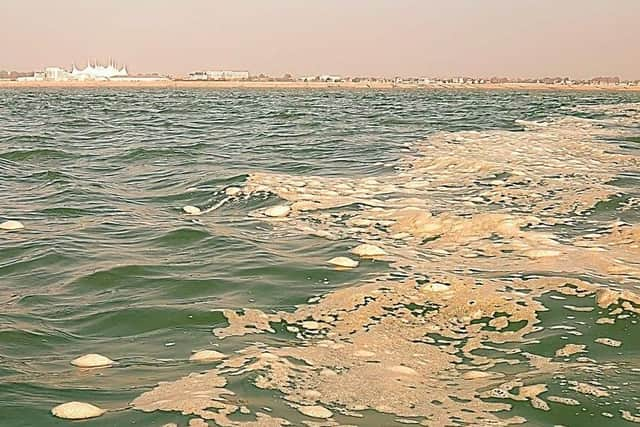"It's a kick in the teeth" says Bognor resident who spotted 'sewage' out at sea
and live on Freeview channel 276
Paul Boniface, 43, saw the supposed sewage on Saturday afternoon (October 9). In a Facebook post written soon after, he said the "sea is criss-crossed with orange-brown foam for the last two miles (from Pagham to Butlin's). I can only imagine this was yesterday's breakfast!"
He spotted the trail not long after confirmed water releases by Southern Water, which took place in Bognor Regis East and Aldwick on October 5 and then again in Felpham on October 6, although there were no water releases on Saturday or the day prior.
Advertisement
Hide AdAdvertisement
Hide AdMr Boniface, who has been diving and paddle-boarding in coastal waters for the last six years, said the releases are a 'kick in the teeth' to residents and environmental activists, particularly after a hard-won inshore trawling ban which was introduced earlier this year.


Effective in March, it was supposed to help preserve marine eco-systems and kelp beds by pushing fishing 4km out from the south coast but, Mr Boniface said, Southern Water releases could be undoing that hard work.
"We're trying to get the seaweed and the ocean habitats back up to their full potential and then you've got this sewage just constantly being dumped in the sea," he said.
"My friend and I, when we've been out, we've seen these beautiful kelp forests that are developing, and now they're covered in fungus, they're covered in disease. And we think this has to be because of the pollution in the water."
Advertisement
Hide AdAdvertisement
Hide AdMr Boniface said that, when he first saw the foam, he 'immediately' thought it was sewage, but mentioned that a number of commenters on Facebook have pointed out it could be an algal bloom. But, even if that is the case, Mr Boniface said, it would remain "an artefact of pollution."
"You get nitrates from sewage and farm run-off pollution, which goes into the sea and causes these blooms. So, from my understanding, it's from the same sort of cause."
This isn't the only time Mr Boniface said he has encountered sewage while out at sea. "When we had a massive thunderstorm in July, and they'd just released sewage, I went out with a friend diving on Sunday morning.
"There was like a dusting of what appeared to be poo. It was all over the seabed. The thing is, because this out in the sea you can't see that.
Advertisement
Hide AdAdvertisement
Hide Ad"I went out with some friends and I just thought about all this beautiful seaweed and ecosystems, and then to go out the next day and see it covered in a layer of what appears to be orangey-brown slime was heart-breaking."
Britain's surface drains connect directly to the sewage system, which has led to concerns that water releases such as those authorised by Southern Water also leads to sewage being released into the sea. For Mr Boniface, the solution is infrastructural, and the country's drainage system needs to be updated.
"The UK has some of the best engineers in the world, and we should be able to come up with a reasonable, cost effective solution to this problem. It's an investment in our future."
Southern Water, which has made clear all its storm releases are authorised by the Environment Agency and only ever actioned to prevent flooding, has suggested the solution might be more complicated. "While simply separating all sewers from surface drains would be a hugely expensive and disruptive process, we believe that a partnership approach is the best way forward," a spokesperson said.
Advertisement
Hide AdAdvertisement
Hide Ad"Regulation on sustainable drainage must be changed so rainwater separation is built in to all new construction. Investment in natural capital such as enhanced and expanded wetlands will be key. Our partnership with stakeholders such as Natural England, the EA and Chichester District Council is leading the way in this."
A spokesperson for the Environment Agency, which has secured 46 prosecutions against water companies like Southern Water since 2015, added: "Storm overflows are designed to discharge sewage to rivers or the sea only at times of heavy rainfall to prevent it backing up into homes and streets. These discharges also require minimum dilution levels and other measures in order to protect the environment.
“However higher population and climate change means storm overflows will discharge more often. The Environment Agency is therefore working actively with water companies to monitor discharges and ensure investment to reduce the harm they do to the environment.”
Read more
Comment Guidelines
National World encourages reader discussion on our stories. User feedback, insights and back-and-forth exchanges add a rich layer of context to reporting. Please review our Community Guidelines before commenting.